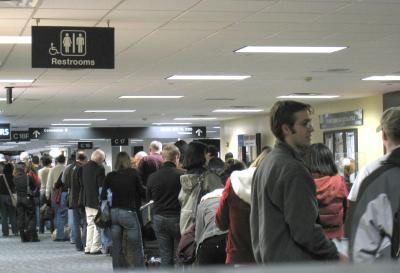Have a projector at the back of big conference presentations
Submitted by brad on Wed, 2008-03-12 17:42Fancier conferences put up two projectors to let the audience see the slides. But the presenters still look at their slides on a notebook on the podium, or in some cases on a monitor on the floor below their stage.
How about adding a projector that projects on the back wall, just above the heads of the audience, for the speaker to see their own slides? Then they can roam the stage and see the slides without losing eye contact with the audience. They may not be able to see clear detail on the slides but they shouldn't need it.






